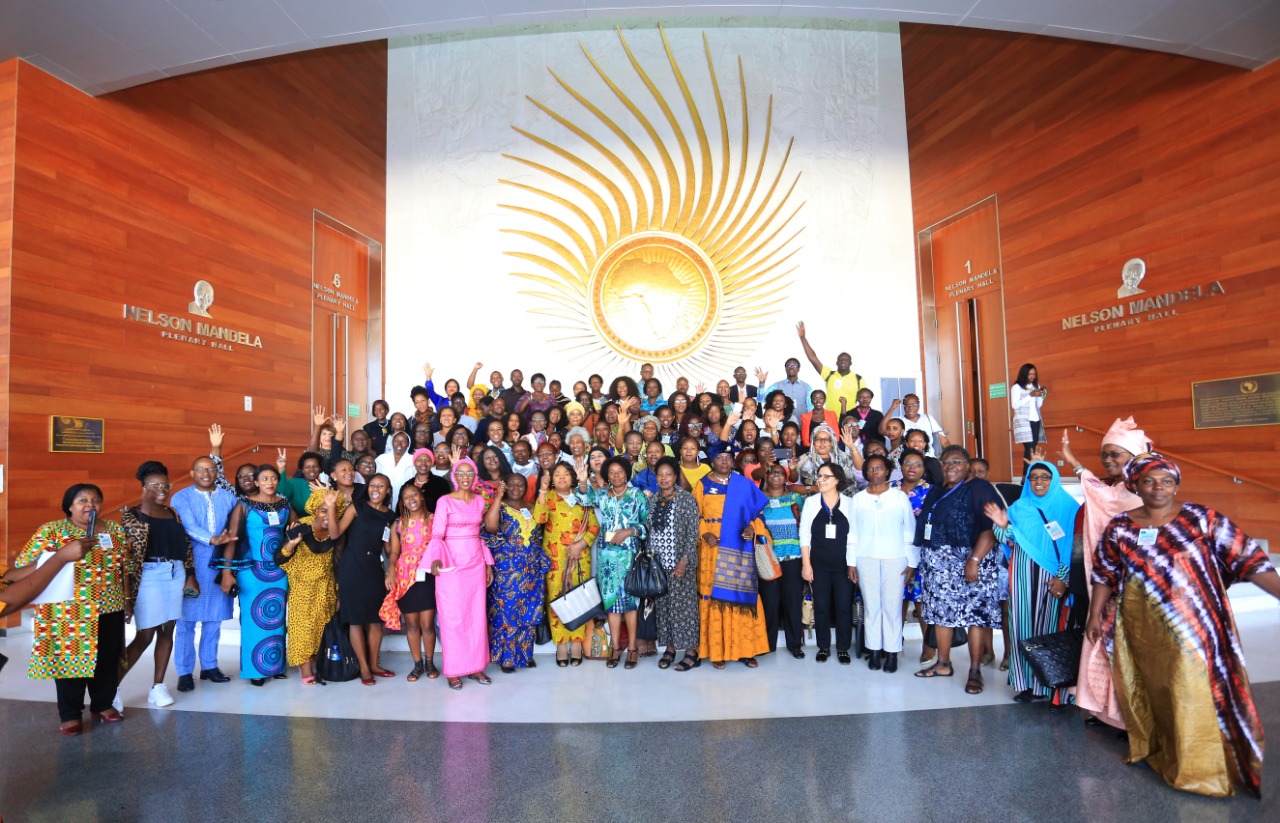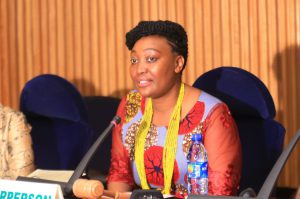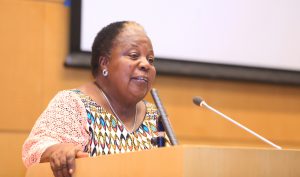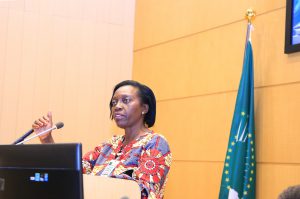
PRESS RELEASE: Governments must deliver on the promises made to women in Beijing 25 years ago
African women will not relent until the “Beijing” Commitments are fully achieved
Addis Ababa 1st November 2019 – Gender equality and women’s empowerment is a must, and women of Africa are not going to settle for less! African women through the African Women’s Development and Communication Network (FEMNET) and civil society organizations meeting in Addis Ababa this week (28th -31st October) want the African Union to mark the year 2020 with substantive focus on gender equality and women’s rights.
This is just but a bare minimum of critical demands the convening is bound to make.
Twenty five years after the pivotal global women’s conference the Beijing Declaration and Platform for Action (BDPfA), women across the world are once again agitating for the African continent to move towards achieving gender equality with renewed zeal and determination.
“We are here to tell the African Union and the United Nations as well as the whole world that the empty rhetoric of making huge promises without delivering them is gone” said Ms. Emma Kaliya, the Chairperson of the FEMNET Board of Directors while addressing the Addis Ababa Meeting.
“Even though this Conference (meeting in Addis) is a review and a prelude to the celebration that will be held next year, Civil Society Organizations need to re-ignite country level activism in order to demand greater gender responsiveness, respect for human rights, transparency and accountability from their governments” She added.

Memory Kachambwa – FEMNET Executive Director
At a CSO Forum coordinated by FEMNET and supported by a pool of partners, civil society from across the continent are convening in their multitudes and echoing their voices and claiming spaces for women’s rights and civil society organizations, collaborating with governments and bilateral partners to take a critical look at the status of gender equality for women in Africa since the BDPfA.
As the review of the 25 years of BDPfA, African women in their own right and diversity at the gathering declared that this time round, they are not taking anything like “No” for an answer.
“Women have fought and worked towards gender equality for far too long. Twenty Five years later, we should not be asking for and pushing for the same issues we were fighting for back in 1995. We should instead be celebrating gains made to bridge the gender gap not still lament on what should have been achieved by now” said Maria Wanza, a women’s rights delegate attending the conference.
Gender equality and women’s rights is a right and not a privilege. African member states therefore have no choice but to fully commit to the implementation of the recommendations agreed upon in the Beijing Declaration and Platform for Action in 1995.
FEMNET’s Executive Director Ms. Memory Kachambwa while addressing the Specialized Technical Committee at the summit reiterated the need for governments to accelerate the implementation of the various laws, policies and frameworks that have been adopted to address the discrimination of women and gender inequalities.
“We are calling for AU member states to work towards achieving the 50:50 gender parity representation requirements that they have committed to in the AU gender policy.” She said while reading out the CSO Statement to the assembly.
While highlighting various gaps and challenges that still hinder the achievement of gender equality and women’s empowerment, Ms. Kachambwa highlighted the urgent need for the AU to end conflicts in Africa out of amongst other devastating impacts, the fact that women and children suffer the most during conflict.
“We call for an end to armed conflict. We urge states to ensure peace & security & the participation of women in all peace & security processes. It is not enough to acknowledge that women are suffering, it is imperative that women form part of the decision-making process to ending conflict. In this, way, their specific needs and issues will be efficiently addressed” She said.
African women have been at the forefront of influencing and contributing to the global agenda for women’s rights. The 3rd World Conference on Women in Nairobi in 1985 resulted in the adoption of “Nairobi Forward Looking Strategies for the Advancement of Women”, which offered a practical and effective guide for global action for promoting greater equality and opportunity for women. The 4th World Conference on Women held in Beijing in 1995 chaired by prominent African women, including Mrs. Gertrude Mongela, who alongside other African women, ensured that the globally adopted Beijing Declaration and Platform for Action’s (BDPfA) framework and its 12 Critical Areas of Concern reflected a number of priorities for African women and girls. Indeed, the BDPfA has been described as a progressive policy framework and blueprint for advancing gender equality and women’s rights – notwithstanding, emerging priorities and issues beyond the 12 critical areas of concern.
Why does gender discrimination still persist?
Today, 25 years after the momentous gathering of women in Beijing, women stand opportune moment to ensure that governments, especially African governments remain committed to the promises made towards gender equality and women’s rights in their countries.
It may seem that with the advent of a multitude of women’s rights organizations, advocates and activists in Africa, the scales of gender equality may have greatly tilted in favor of women.
Sadly, the opposite still remains true. Where countries were closed towards opening up spaces for women in political situations, the circumstances have been made worse by non-implementation of policies and legislations that continue to lock out women from realizing their full rights and living in dignity. For example following BDPFA most African countries revised their constitutions and made progressive provisions on gender, but these have failed to translate from paper to practice, women still face numerous barriers getting into politics.
No country has so far achieved Gender equality, the Sub-Saharan Africa region is scoring lowest overall in the Equal Measures 2019 SDG Gender Index (see. https://data.em2030.org/. The region’s highest ranking country, Mauritius, is still 20 points away from meeting gender targets for girls’ and women’s equality as measured by the index.
Where violence against women has been exacerbated by cultural and social norms or has been re-enforced in times of conflict and war, most countries score lowest on child marriage, intimate partner violence, and abortion. The proportion of women aged 20–24 years who were married or in a union before age 18 indicates that thirteen of the lowest scoring 15 countries on the measure of child marriage are in sub-Saharan Africa (order of highest rates of child marriage: Niger, Chad, Burkina Faso, Mali, Mozambique, Nigeria, Malawi, Madagascar, Ethiopia, Uganda, Sierra Leone, DR Congo, and Mauritania). (see. https://data.em2030.org/.
The struggle continues in the area of women’s representation in governing bodies. This is even more starkly apparent in regards to positions of leadership: we now see a deliberate and concerning trend to further exclude and discriminate women from positions of power and decision-making. The proportion of seats held by women in national parliaments and proportion of ministerial/senior government positions held by women. Only Rwanda (61 percent of parliament), Namibia (46 percent), South Africa (42 percent), and Senegal (42 percent) all rank in the top ten countries in the 2019 SDG Gender Index in terms of women in parliament. (see.https://data.em2030.org/.

Her Excellency Getrude Mongela –Torch bearer to the BDPFA 1995
Where efforts to increase the spaces and opportunities for girls to get equal and transformative Education and academic skills, we are now seeing a disturbing increase in sexism, objectification and harassment. Sub-Saharan Africa has one of the bottom two regional scores on this indicator, but Angola and Madagascar are among the three highest scoring countries in the region. (see.https://data.em2030.org/.
These and more stretching gaps of inequality taint the aspirations and hopes of the BDPFA that the presiding 25 year commemoration of the landmark process should be much more substantive towards real change.
Getrude Mongella, a former legislator and a re-known women’s rights advocate from Tanzania who led the African delegation to the BDPFA in 1995 urged for a smooth transition of the baton for the achievement of the BDPA promise from the old generation to the young in a manner that will ensure the struggle continues with absolute victory.
“ What we learnt from the Beijing process is wisdom, tolerance and perseverance. In our African culture, we have children, adults and elders and they are interacting all the time. Every generation has its responsibility. We as the veterans must now hand over to the younger generation so they can safeguard what we have gained in our social independence”. She said. “Gender equality for this generation is an absolute must and it must be protected”.
Speaking on the critical issue of commitment to the BDPFA promise, Former Presidential aspirant and Multiple-time member of parliament from Kenya Hon. Martha Karua took issue with political processes in countries that deny women their right to full political participation as outlined in the law.
“It is sad that women still agitate for positions that are already provided by law in the quota system. This is a right that is theirs for the taking and should not be contested”. She said. “ Women should vie for elective positions in addition to the quotas they get from their political parties. They should also avail themselves for elective positions because how will you be elected if you don’t offer yourself for these positions”.
The United Nations Economic Commission for Africa (UNECA), the Africa Union, UN Women and women in all their diversity are amplifying their resolve to for once and for all call for total commitment to the promises made in Beijing involving the 12 critical areas of concern; women & the environment; women in power & decision-making; the girl-child; women & the economy; human rights; women & education & training; violence against women; women & poverty; Institutional mechanisms for the advancement of women; women & health; women in armed conflict; women in media.

Hon. Martha Karua – Kenya Presidential aspirant & Legislator
It is important to note that the gains and achievements continue to trickle in regardless on the slow pace. It for example is important to note that in Africa today, since the adoption of the BDPfA, we have at least 42 countries that have signed on to the Protocol on the African Charter of Human & People’s Rights on the Rights of Women in Africa better known as The Maputo Protocol. This is a great achievement given that it is one of Africa’s blueprints towards gender equality and women’s rights.
It is also worthy to note that Africa is progressively working towards achieving the 2030 Agenda for Sustainable Development Goals (SDGs 2030) albeit with painfully slow progress towards gender equality and women’s rights. The same applies to the realization of Africa’s Agenda 2063 and many other policies and legislations just as the commitment made to the BDPfA that would by now make life way much better for women and girls in Africa.
African Women will not relent!
As Africa women converge in Addis Ababa, the resounding message is that of defiance; determination and audacity – women will not relent!
There is no relenting in the push for gender equality; there is no relenting in the agitation for ending violence against women and girls; there is no relenting in stretching for equal spaces for women in the political spheres; there is no relenting in any single struggle to uplift the equal rights for women and girls in Africa.
African women are speaking directly to the regional bodies; to the African Union, to the United Nations and to all instruments of power and are now demanding that the Beijing+25 processes be made a priority in the coming year.
To the African Union, the women of Africa are demanding that the AU specifically addresses the issues that arose from the BDPfA 25 years go in the upcoming AU Summits of 2020.
This is the only way that Africa will ensure that the needs of women and girls in the continent remain a priority. Before African heads of states fly to diverse capitals in the global north; to New York, to Mexico and France, they must ensure that they have put their houses in order when it comes to women’s rights and equalities before signing huge global policies that exclude women’s participation.
The process that pushed forward the BDPfA 25 years ago clearly was pegged on shifting the status of women and girls in Africa. Those who fought for these paces wanted women and girls to be recognized as equals and not to be discriminated in any way because of their gender.
Today, 25 years later, we still address the same issues of discrimination, violation and abuse even though our focus is now strongly pegged on the African feminist agenda that is unapologetically committed to women’s’ rights and equalities.
The backlash on gains must stop!
Despite the countless forums and platforms local, regional and global that mark agitation for gender equality and women’s rights, it is concerning that the world and Africa in general is witnessing a backlash on gains made towards bridging the gaps of gender inequality.
It is sad that for example in many African countries, women are still agitating for the quota system or affirmative action in political spaces. We are witnessing a major drawback as women demand only that which is ironically provided in constitutions and policies as agreed upon since the BDPfA. How can women are subjected to this double layer of violation and discrimination while provisions for their rights and equality are clearly outlined in legislation. Where are governments that commit to these laws when they are being violated?
The BDPfA made it clear in its resounding resolutions the importance of having 50% gender representation in all spheres without exclusion. Why is this therefore not a reality in African countries 25 years after the BDPfA?
African civil society converging in Addis is categorical that this time around, it is a push that is bound to bring substantive and lasting mechanisms and systems towards gender equality and women’s empowerment.
Africa is keen to engineer the steady transfer of the baton towards gender equality to the younger generation of Africa’s women and girls who will pick up the battle from now hence-fourth.
The generation equality – the young women who are rightfully flocking the spaces for the agitation for rights and equality need our uttermost support and solidarity to ensure that the battle pushed through by the army of women’s rights agitators in 1995 is won to the full.
This victory will however not be possible without the full and total commitment by African governments to the loyalty pledges on gender equality and women’s rights. These will not be achieved through lip-service.
This is the message and FEMNET and the African women convening in Addis Ababa this week are taking to the UNECA and to the African Union with uttermost clarity.
Stakeholders such as the media in Africa, who are also part of the 12 areas of concern in the BDPfA must actively and proactively take it upon their focus to articulate the BDPfA and the Beijing+25 to Africa’s populations for deeper understanding and appreciation. Unless Africa’s media takes it upon herself to actively agitate and support the total commitment to gender equality and women’s rights, the gaps will always prevail.
For more information and/or to request for an interview, please contact:
FEMNET’s Head of Communication, Mildred Ngesa: m.ngesa@femnet.or.ke
Tel: +254 727137853






